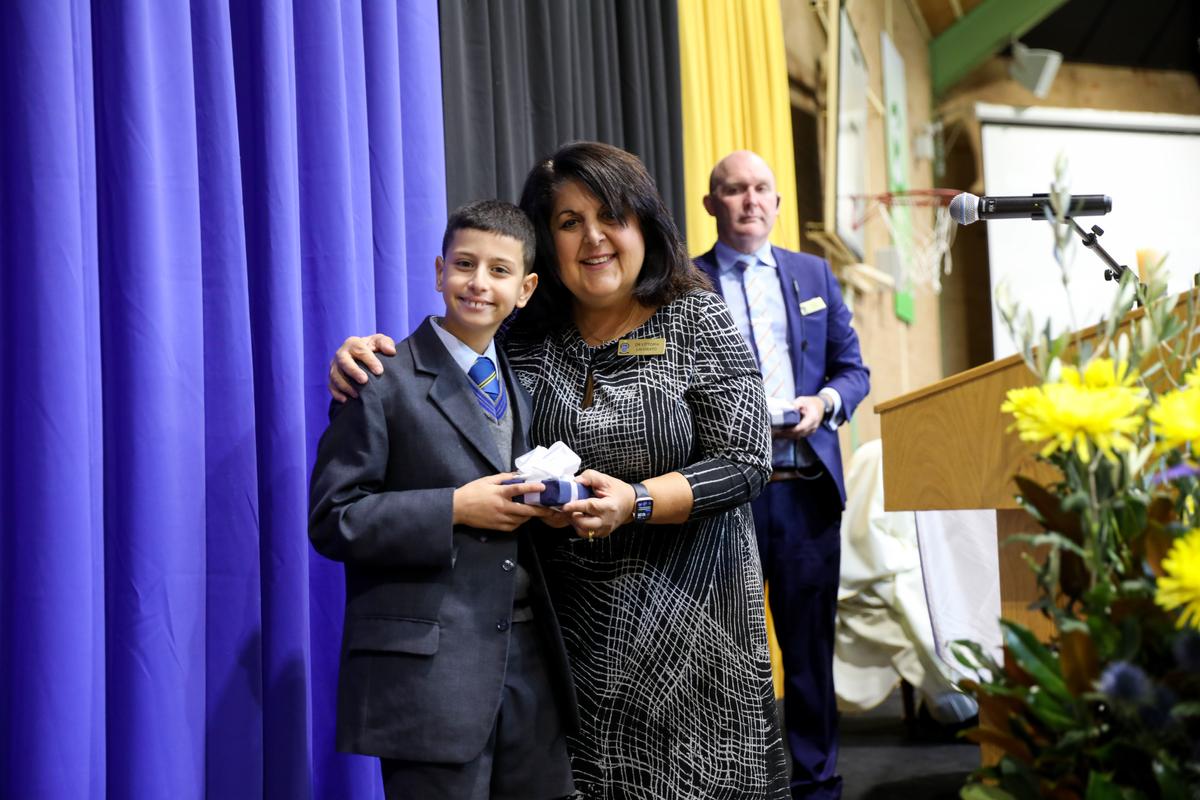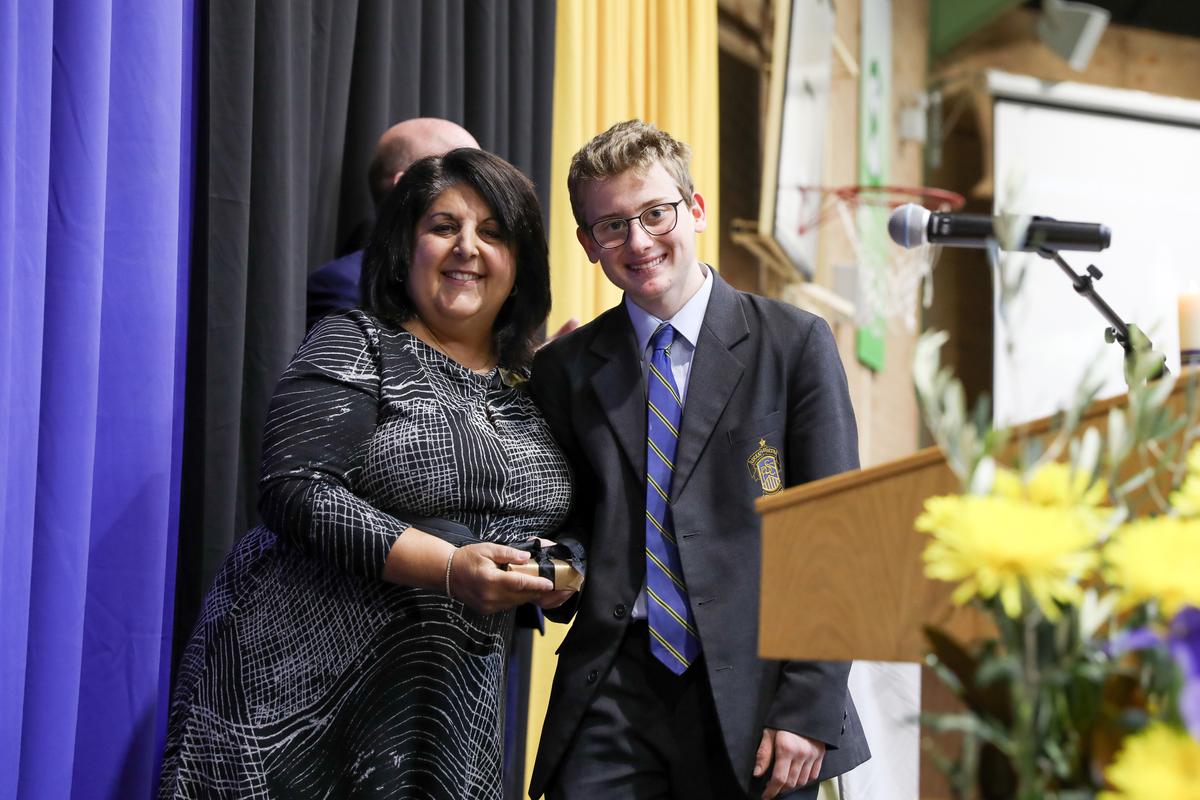Principal

Your Report Grade is Not the Sum Total of Your Worth
We are coming up to Parent/Teacher Interviews for Years 5 to 10 and the issuing of the Semester 1 Report and I know that there is some anxiety amongst the boys. I still remember the first poor grade (50%) that I ever received in high school. I still remember the feelings that I had that day, the thoughts that I would never be able to learn that subject as well as I wanted and the disappointment I was to my family.
Reflecting back now, I can understand that my disappointment wasn’t that I had only remembered 50% of the words I was being tested on. It was true, I had only remembered half of the words, and understanding that helped me realise that I needed to study more if I ever wanted to be able to master that subject. My disappointment stemmed from what I felt the grade said about me. It was the first time I had scored poorly in a test, and I was suddenly feeling like I wasn’t as smart as those around me.
I’ve come to realise as an educator and mother that there’s a disconnect between what grades are actually for, and what students often think about them.
What grades are actually for: showing our children what they know and what they still need to work on.
What many students think about grades: Where do I rank among my peers? Am I a high achiever? Or am I not as smart as everyone else?
Unfortunately, for many students, this type of thinking causes increasing stress and anxiety in their final years of high school, where an over-fixation on ATAR scores results in many students feeling as though their self-worth can be summed up in a single number.
Our task: to teach our kids that their grade isn’t who they are. This is important for students who are struggling, but just as important for those who get perfect marks on almost every test. Yet before we leap into trying to teach this to our kids, the first person who needs to believe it is you.
You probably grew up believing that your life prospects depended on the outcome of each test and exam you did. But look around you. Can you pick the ATAR score of your co-worker? Which of the parents/carers in the school pick-up line was the dux of their school? Which of the people at your church or gym or pottery class failed their Geography exam in high school? Can’t tell? Of course not! Our grades are part of our story. But they do NOT define our story.
In fact, our grades impact our lives much less than our attitude to our grades do. For example, there are many pathways to most careers. You could be a high school dropout and go on to be a doctor or a lawyer or a particle physicist if you’re patient and determined enough (and I know several who were dropouts and still managed to have these types of jobs). You just need to believe that it’s possible and believe that you can get there. But if you allow yourself to believe that your low grade prohibits you from achieving your goal, you’re limiting yourself.
Now that you’ve reminded yourself that grades don’t define your child, you’re prepared for when they come to you with the inevitable bad grade.
When that happens, remember these 3 things:
1. Remind yourself that grades are much less important than your attitude about grades.
To model that, you need to focus less on the grade, and more on the attitude.
Here’s what it sounds like when we focus on the grade:
“60% hey? Looks like there’s room for improvement.”
Here’s what it sounds like when we focus on the attitude:
“How do you feel about your mark?”
Don’t even mention the number (or the letter, depending on how grading works at your school)! Instead, ask them how they feel about how they did.
2. Remind them that grades reflect where they are in their learning journey.
They are not the final destination. Work with them as they reflect on what they understand well, what they could work on further, and then make a plan for how they can do that. Maybe they will ask their teacher for extra maths problems. Or maybe you can listen to them practice their next oral presentation.
3. Cultivate a 'growth mindset'.
If your child comes to you saying, “I can’t do fractions”… or “I’m no good at breaststroke”… or “I don’t understand titration”… just add the word “yet”.
- “I can’t do fractions…yet” reminds them that while they can’t do it now, they can learn them one day.
- “I’m no good at breaststroke…yet” encourages them that with practice, they can get better.
- “I don’t understand titration… yet” reassures them that they might understand it tomorrow.
Being able to accomplish great things doesn’t depend on high test scores. It just depends on an inner conviction that greatness can be accomplished. Believe in your child. Believe in their ability to accomplish greatness. And believe that they can accomplish great things even with a low grade on whatever test they had today.
Being able to accomplish great things doesn’t depend on high test scores. It doesn’t depend on being better than others. It just depends on an inner conviction that greatness can be accomplished. Believe in your child.
Founder's Day
Last Friday, the whole school celebrated its founder, Blessed Edmund Rice, with a mass, shared meal, the Waterford Mile, and Year 12 Performances. It was a wonderful day.
We especially welcomed our special guests:
- Mrs Maura Manning, CEO and Director EREA NSW Colleges
- Mrs Helen Randall, College Advisory Council
- Dr Anne Wenham, College Advisory Council
- Ms Natalie Baini, College Advisory Council
- Mrs Jamey Poyaoan, College Advisory Council
- Caroline Chahin, Vice President, P&F Committee
- Br Tony Whelan, cfc
- Br Dan Stewart, cfc
- Br Bob Wallace, cfc
- Br John Henry Thornber, cfc
- Br Vince Duggan, cfc
- Br Michael Walsh, cfc (Old Boy)
- Fr Jack Evans, Celebrant
I have worked in schools founded by the Christian Brothers, now run by EREA for 20 plus years and thought that I knew all about Edmund Rice until my return from my visit to Ireland.
The pilgrimage was organised by Edmund Rice Education Beyond Borders (EREBB) which is an international network of Catholic schools educating young people from many different faiths and cultures.
Edmund Rice educators, like me, today are still inspired by his example which was grounded in the teachings of Jesus, Gospel values in over 22 countries. The Edmund Rice Family has spread across the world since Blessed Edmund opened his first school in 1802, a place where I have now actually visited and can better appreciate the obstacles he had to overcome.
The highlight for me was the walking tour of Waterford that really helped to put into context who this man was and what has led to this incredible movement around the world to liberate children through education.
He was born and lived in the 19th century in Ireland in the wake of the widespread uprising of 1798, which saw the brutal suppression of the Irish by the British. The revolutionary spirit endured and would reverberate in Ireland throughout the 1800s. Millions faced starvation.
A wealthy man in a country where Catholics were suppressed by the British, he could have lived his life comfortably, enjoying his great wealth. But early tragedies in his life such as the loss of his wife, caring for a disabled daughter and the execution of some of his relatives changed him. He began his work slowly but surely. He had a strong belief that education of the poor children of Waterford was the only way to liberate from a life of poverty and one with no opportunity for betterment. Soon other men followed him. A movement began that today has led to schools founded by his followers in over twenty-two countries.
Students have asked me how I will use what I learned overseas.
So many people expect change in others, expect change in the world, but are never willing to change themselves first.
Edmund Rice was a man of action. And the lesson I have come away with?
If you want to see change in others, you must first BE THE CHANGE YOU WISH TO SEE.
If I want others to be better: I MUST BE BETTER.
If I want my friends to act a certain way: I MUST LIVE that way, I must BE THAT EXAMPLE.
Not TELL them how to be but BE that person. If I want them to be kind to others: I must be kind to others.
If I expect others to be KIND: I must be kind, I must be compassionate.
If I expect others to listen and be understanding, I MUST listen, really listen, and really try to understand.
If we do expect all these things, we will need to live these things. Let each of us here today live as the person we expect others to be. Let us be the change that we wish to see.
Founder’s Day Award Winners
After asking the boys to nominate the boy who they feel was the embodiment of our touchstones, the boys identified by their peers were:
- Stage 3 Frank Malkhoun (Year 5)
- Stage 4 Tim McCormick (Year 8)
- Stage 5 Heath Patterson (Year 9)
- Stage 6 Antonio Laggis (Year 12)
It was wonderful to hear the rousing applause each boy received from their peers. Congratulations!
Community News
We keep the following people in our prayers:
- Ms Giselle Grape who suffered a fall over the weekend, badly broke her arm and is in hospital awaiting surgery.
- Michael Sakr (Year 11) whose father is gravely ill and in hospital at present.
Dr Vittoria Lavorato
Principal
SPC boys can do anything!
**except divide by zero




